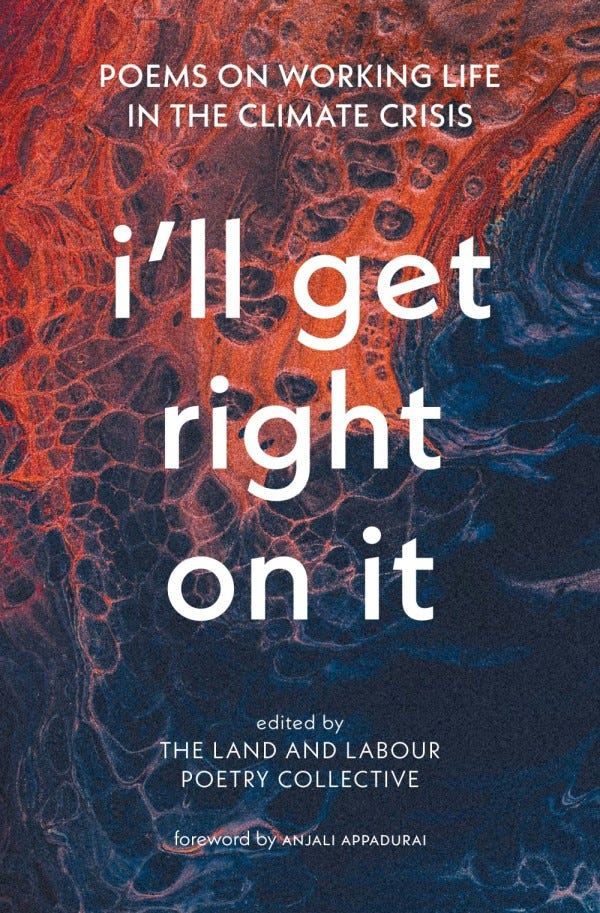I’ll Get Right On It: Poems on Working Life in the Climate Crisis
Edited by The Land and Labour Poetry Collective
Incoming storms, invasive species, and farmer’s laments. Overheated classrooms, reconciliation work, and an uncertain future. These are some of the scenarios addressed in I’ll Get Right On It: Poems on Working Life in the Climate Crisis.
The collection invites readers “to think and feel through the many ways climate change transforms our working lives.”
I’ll Get Right On It was edited by The Land and Labour Poetry Collective. As the back-cover content notes, the collection invites readers “to think and feel through the many ways climate change transforms our working lives.” The poets express themselves in different ways, some using form poetry, and others using free verse, but regardless how they are formatted, the poems offer a sense of authenticity.
Some poems address the sense of loss that comes to recognizing the damage, some of it irreversible, being done to the planet. “There Has Been Something” by Ed Edmo notes, “there has been something / that has disappeared / from my mother earth.”
We hear from individuals whose daily jobs put them in direct contact with the impact of climate change. For example, “Hold, Please” by Lia M. Markin includes the lines,
There’s a fire somewhere.
I sniff it in the air,
in the lines we trace between us,
the hold time growing longer
as the storms get louder
outside,
“911—This is an Emergency” by Renee Cronley observes:
Call volumes are rising
like the temperatures
of our longer summers,
and lightning keeps striking
tired, dry litters of deadfall
“An Inordinate Number of Insects (Field Notes from a Naturalist)” by Karen Loucks comments:
Winters not cold enough to halt the march of beetles.
Snowpack not deep enough, so that pikas freeze
in their small scree tunnels. Some years too cold,
some years, a spring too late.”
Some of the poems address growing disillusionment. In “Bootstraps: Labour Day, Lordstown, Ohio,” Jim Daniels writes:
I dreamt we levitated to the factory roof
like in the aerial photo they presented me
as a gift to retire early, shortening the dailyline of ants drawn to the fake sweetener
of the American dream.
Other writers comment on their fears for the future. “where do you see yourself in five years?” by Alison Holliday portrays a job applicant at an interview:
i am pretending i can think five years into the future
without imagining apocalypses
—more than the one we are currently living—
i would like to be twenty-two and have hope,
and a voice that is not so bitter at the beginning of my career.
“Those Days Before the Mine” by Jon Broderick imagines the aftermath of a proposed copper mine that, despite the company’s promises, has the potential to cause environmental degradation:
The water’s cold and clear there yet
Aye, cold and clear and bare.
Now nothing lives is Nushagak
Though salmon once ran there.”
Some of the content is saddening or even stark, but there is also humour woven through some of the poems. To quote Jim Daniels’ “Bootstraps” again,
. . . The smokestacks are giving up
cigarettes forever. Down here, we’re learning
how to vape and make playlists of our
greatest hits.
“Last Christmas” by A.W. Glen comments, “In fall 2023, I do freelance proofreading of environmental research papers / I discover that the apocalypse is frequently short on commas.”
Some poems also contain flashes of hope. One example is “Doing Reconciliation Work in Wînipêk” by Jamie Paris: “The work is impossibly difficult / but it might be easier if we do it / Together.”
While reading I’ll Get Right On It, I found the poems drawing me through the book. There was an appeal to vicariously experiencing so many different writers’ experiences in so many different types of work. Enjoyable and often starkly honest, I’ll Get Right On It is an eye-opening collection that lives up to the promise on the back cover, exposing readers to multiple ways of seeing, and feeling about, the climate crisis.
About the Editors
The Land and Labour Poetry Collective is a collaborative editorial group based in the prairie and western provinces of the lands now known as Canada. The collective includes award-winning poets and nonfiction writers who work or have worked in farming, geology, project management, oil and gas, research, teaching, editing, and manual labour. Its members are Moni Brar, Jenna Butler, Samantha F. Jones, Jamie Paris, Kelly Shepherd, and Melanie Dennis Unrau.
About the Reviewer
Ontario resident Lisa Timpf writes poetry, book reviews, short stories, and creative nonfiction. Her speculative poetry collections Cats and Dogs in Space (2025) and In Days to Come (2022) are available from Hiraeth Publishing in print and electronic formats. You can find out more about Lisa’s writing projects at http://lisatimpf.blogspot.com/. Lisa is also on Bluesky, @lisatimpf.bsky.social
Book Details
Publisher: Roseway Publishing
Publication date: Oct. 2 2025
Language: English
Print length: 224 pages
ISBN-10: 1773637444
ISBN-13: 978-1773637440




